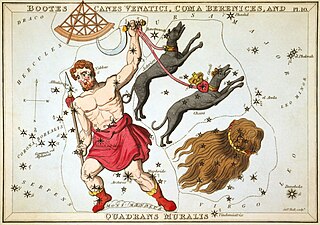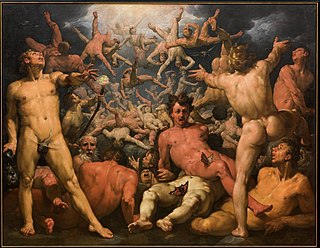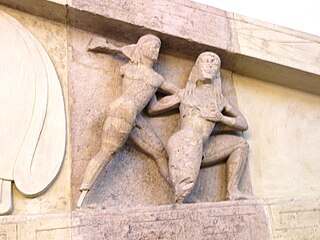 W
WThe Aegimius is a fragmentary Ancient Greek epic poem that was variously attributed to Hesiod or Cercops of Miletus during antiquity. The "Aegimius" of the title was surely the son of Dorus, but the surviving fragments have nothing to do directly with this figure, and, despite his status as title character, it cannot be inferred from the available evidence that the poem was primarily concerned with the Dorian king. Instead other myths, such as those concerning Io, Theseus, and the golden fleece, are found among the handful of fragments preserved in other ancient authors as quotations and paraphrases.
 W
WThe Argonautica is a Greek epic poem written by Apollonius Rhodius in the 3rd century BC. The only surviving Hellenistic epic, the Argonautica tells the myth of the voyage of Jason and the Argonauts to retrieve the Golden Fleece from remote Colchis. Their heroic adventures and Jason's relationship with the dangerous Colchian princess/sorceress Medea were already well known to Hellenistic audiences, which enabled Apollonius to go beyond a simple narrative, giving it a scholarly emphasis suitable to the times. It was the age of the great Library of Alexandria, and his epic incorporates his researches in geography, ethnography, comparative religion, and Homeric literature. However, his main contribution to the epic tradition lies in his development of the love between hero and heroine – he seems to have been the first narrative poet to study "the pathology of love". His Argonautica had a profound impact on Latin poetry: it was translated by Varro Atacinus and imitated by Valerius Flaccus, it influenced Catullus and Ovid, and it provided Virgil with a model for his Roman epic, the Aeneid.
 W
WThe Astronomia or Astrologia is a fragmentary Ancient Greek hexameter poem that was attributed to Hesiod during antiquity. As the title of the poem suggests, it was astronomical in focus, dealing with the stars. It has been suspected that the Astronomia influenced the style of Aratus' Phaenomena, but the remains of the Hesiodic poem found in ancient quotations are too meager to allow for certainty on this matter.
 W
WThe Catalogue of Women — also known as the Ehoiai — is a fragmentary Greek epic poem that was attributed to Hesiod during antiquity. The "women" of the title were in fact heroines, many of whom lay with gods, bearing the heroes of Greek mythology to both divine and mortal paramours. In contrast with the focus upon narrative in the Homeric Iliad and Odyssey, the Catalogue was structured around a vast system of genealogies stemming from these unions and, in M. L. West's appraisal, covered "the whole of the heroic age." Through the course of the poem's five books, these family trees were embellished with stories involving many of their members, and so the poem amounted to a compendium of heroic mythology in much the same way that the Hesiodic Theogony presents a systematic account of the Greek pantheon built upon divine genealogies.
 W
WThe Dionysiaca is an ancient Greek epic poem and the principal work of Nonnus. It is an epic in 48 books, the longest surviving poem from antiquity at 20,426 lines, composed in Homeric dialect and dactylic hexameters, the main subject of which is the life of Dionysus, his expedition to India, and his triumphant return to the west.
 W
WThe Shield of Heracles is an archaic Greek epic poem that was attributed to Hesiod during antiquity. The subject of the poem is the expedition of Heracles and Iolaus against Cycnus, the son of Ares, who challenged Heracles to combat as Heracles was passing through Thessaly.
 W
WIn Greek mythology, the Titanomachy was a ten-year series of battles fought in Thessaly, consisting of most of the Titans fighting against the Olympians and their allies. This event is also known as the War of the Titans, Battle of the Titans, Battle of the Gods, or just the Titan War. The war was fought to decide which generation of gods would have dominion over the universe; it ended in victory for the Olympian gods.
 W
WThe Titanomachy is a lost epic poem, which is a part of Greek mythology. It deals with the struggle that Zeus and his siblings, the Olympian Gods, had in overthrowing their father Cronus and his divine generation, the Titans.
 W
WThe Vision of Dorotheus or Dorotheos is an autobiographical Homeric Greek poem, composed in 343 lines of dactylic hexameter and attributed to "Dorotheus, son of Quintus the Poet". The poem chronicles a vision, wherein the author is transported to the Kingdom of Heaven and finds himself in its military hierarchy. He is conscripted into and deserts his post, only to receive punishment, be forgiven, and rediscover his Christian faith. The poem, penned sometime in the 4th-century, depicts the Kingdom of Heaven in an Imperial fashion; Christ is enthroned as emperor, surrounded by angels bearing Roman military and official titles, with the military structures of the Kingdom of Heaven modelled on those of Rome.